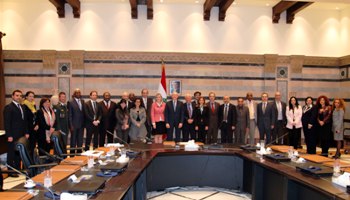 United Nations Country Team meeting with Prime Minister Tamam SalamWHO's Representative in Lebanon Dr Hassan El Bushra was one of several UN representatives participating in the United Nations Country Team (UNCT) meeting with Lebanon's Prime Minister Tamam Salam.
United Nations Country Team meeting with Prime Minister Tamam SalamWHO's Representative in Lebanon Dr Hassan El Bushra was one of several UN representatives participating in the United Nations Country Team (UNCT) meeting with Lebanon's Prime Minister Tamam Salam.
The meeting aimed to introduce to the new Government of Lebanon the work of the UNCT in supporting Lebanon at this time. The team explained the core objectives of UNCT support and outlined immediate priority programmes.
Prime Minister Salam praised the work of the UNCT and expressed appreciation for their commitment to Lebanon. He praised the prominent UN role in the humanitarian effort; the level of professionalism of all involved and cited the enabling role the UN played in supporting the Government.
The Resident Humanitarian Coordinator Mr Ross Mountain congratulated the Prime Minister on his appointment and on the formation of the new government and expressed hope the UN’s work remained relevant to his Government, and in particular, his three priorities of security, elections and the impact of the Syrian conflict on Lebanon. He outlined the scale and scope of UN operations in country, its growth in the past year to mount the humanitarian response, lauding the tremendous human capacity that served as national staff in the organization. He noted the UN’s steadfast commitment to meeting the growing humanitarian needs and stabilizing Lebanon from the myriad impacts of the Syrian conflict. The close coordination with the Government would continue, particularly with the Prime Minister’s Office and Ministry of Social Affairs.
The scope of this work centred on four primary areas: peace and security, humanitarian, stabilization and socioeconomic development. Although much of what the UN is known for is its humanitarian work, the UN has a long history in Lebanon of partnership. Highlights of the UN’s work in each of these areas were given. He noted many problems exacerbated by the Syrian conflict developed from pre-existing Lebanese challenges. He stressed that host communities are the most pressing issue and that the humanitarian response was increasingly focused on channeling support to Lebanon, at the institutional, municipality and local level. Fortifying Lebanon’s resilience was a priority, to relieve the demand on services, recovery from the shock and provide support to institutions and programmes that aimed to progress their longer term development goals.
The impact of health and education strains on households were raised as primary health care support and medicine distribution, food vouchers, immunization campaigns and school rebuilding projects were prioritized as key components of support to the most vulnerable. Agencies stressed that this support was provided to refugees and Lebanese, however indicating that its scale was insufficient.


